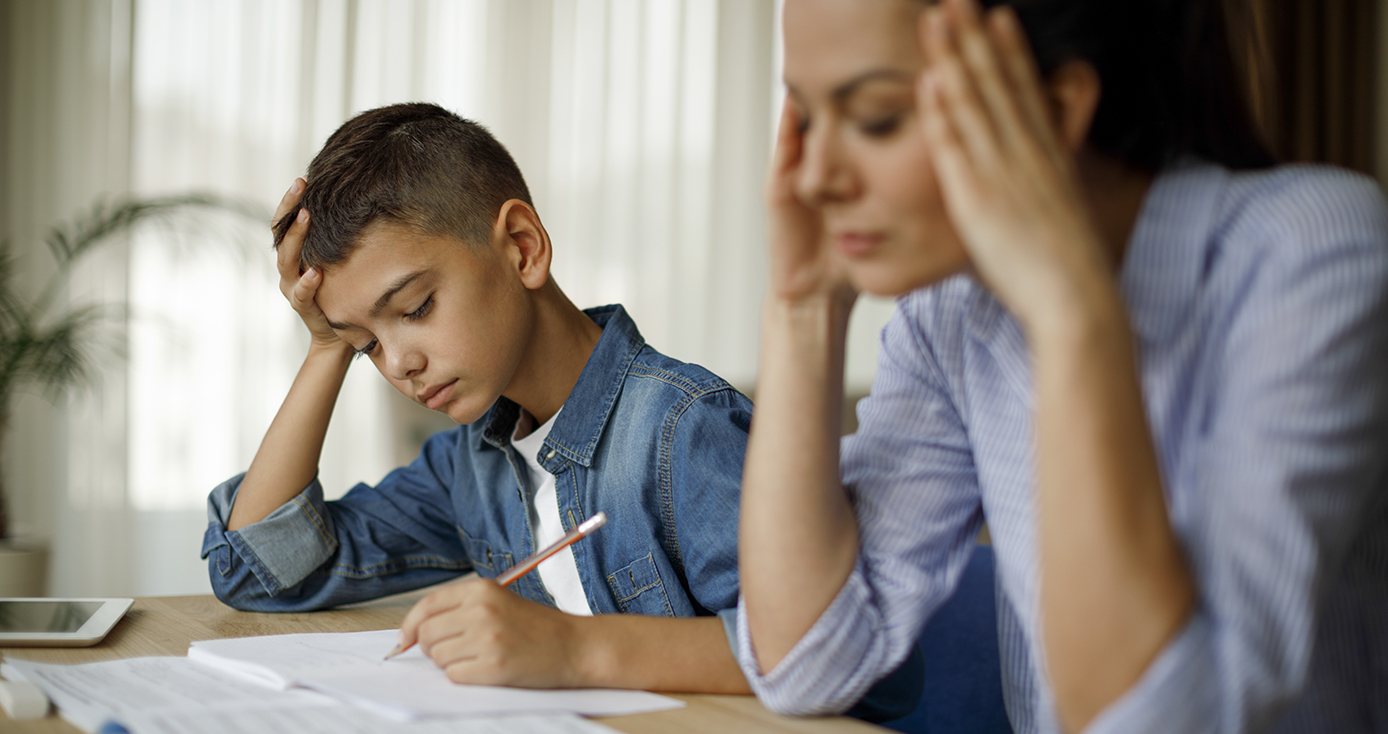Millions of parents around the world are now living the trauma of a serious outbreak of Covid-19 virus; to ensure their loved ones and keep their spirits up, arriving to deal with the sudden closure of schools and the transfer of education to “Home schooling”, which throws the ball in the parents’ playground in the first place. It forces them to adapt to dozens of challenges.
Let’s listen to meaningful ideas provided by education experts in safe transit for your student son and provide educational and emotional support to him; when he is ultimately isolated away from normal life and daytime activities..
Adapting to a new reality
This extra time with your child will probably reveal his personality and inclinations, and make sure that -in the attempts to adapt- you have to be flexibility (giving up the role of a fierce teacher!),adapt Ideas of reward and punishment, providing a relatively quiet place, scheduling life to suit the needs of children and their study participation, providing the necessary technological support from an Internet-enabled computer to communicate with the school.
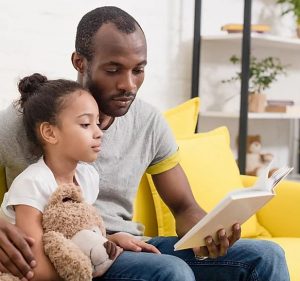
home studing- tb: others
In The “Today” newspaper, Terra Peter draws attention to the importance of involving children in creating that appropriate educational environment within the home.
There are those who love financial incentives and there is nothing wrong with that, including some increase in allowances or electronic games, candy and the like, with sufficient rest within the day and turning everything into the game as well and embodying lessons in the form of life problems closer to the mind of the child.
Effective home learning
According to Katherine Hill in The “New York Times”, experts usually advise you to communicate well with the eye when teaching, before giving oral instructions to children. After you’re done, ask them to restate the key points of what you said.

home studing-tb:others
Experts say most primary school children can work on tasks for about 25 minutes before they need a break. That’s why use a timer to arrange breaks, which can also become transitions to new tasks.
It is important for children to do some jumping exercises, get a drink of water, take a short walk, play a game to help them refocus. Avoid online videos or comic books until the end of the day. These make good rewards, but can be distracting midday.
Today’s schedule is above the fridge!

child design a schedule- tb:others
You need to create a routine that your child from the beginning, because this day’s schedule and breaks, according to experts, makes education easier and more effective at home, and makes it feel like we’re on the end of the year and doesn’t have to worry.
It is important to give priority to children in drafting the materials they wish to study during the day, making appointments and receiving various promotional grants (each task that is accomplished can be marked and linked to rewards).
Also make sure that you communicate effectively with teachers, school management and lessons as well as assignments, activities and the like, they’ve sent and the better you can get your child involved in that communication, seeing and hearing his teacher is psychologically supporting him.
According to the New York Times, an education expert, Jordan Bekele, is advising that learning should be for two hours in total for children in major stage 1, which covers the second year. This should include arts and crafts and practical activities. Children in main stage 2, which covers the third year up to the sixth year of primary school, will be able to do more: about three to four hours. But again, this should include PE activities and more creative tasks as well.
Angelina Thayer in her wonderful blog “teachingmama”, tells us ideas to keep home schooling fun, such as the visual table for young children with today’s activities, which gives him a good idea of his tasks and follows them and we can hang it on the refrigerator for example and we can hang it with a brawl over a rope, where each picture contains A specific activity such as English language duty, then a short break and so on.
Dr. Bisman at ChildMind institution tells you that it will be an opportunity at leisure to give your son responsibilities at home, such as collecting his toys at a young age, contributing to the care of younger siblings, simplifying lessons for them (in the case of older children), and household chores such as cooking. Collecting objects, arranging rooms and sterilizing them.
Keep them out of the circle of anxiety
David Anderson, a psychologist at the “Child Mind”, says that going back to the 1980s in a brainstorm before screens and electronic games can see what you can do to ease your son’s isolation; and sharing them with fun arts and complaints (say, a daily set of days before sleep and after lunch).
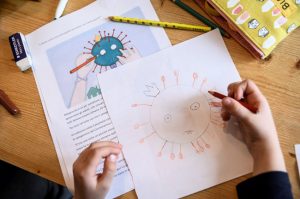
your son and corona-tb:others
It’s important not to reflect the bad news for corona victims for your children; They should be caught in the circle of awareness and caution about such as “social distancing” and wash their hands and things for non- infection, but not the excessive fear that is frustrated, and inhibits immunity.
Mark Renick at the institute itself warns against full integration with social media, hindering the building of a healthy positive day, but there is a possibility to give your children some time to connect with their peers and break isolation. Just a balance is required.
Of course, there is a challenge for some to create a favorable environment away from violence, harsh social conditions, parents’ quarrel with brothers, and the like, things that experts consider possible disadvantages of domestic learning.
Make it a safe, happy time
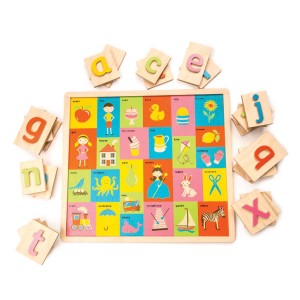 The sportive activity and the arts will be of double importance to your son psychologically in his home isolation, which leads to cases of anger and severe depression in many teenagers and young people around the world, So make sure that his rest times are not just an additional isolation with smartphone screens, and share games Free (such as football at home), reading the things he loves, drawing, handicraft, playing and learning new things like cooking or farming and the like.
The sportive activity and the arts will be of double importance to your son psychologically in his home isolation, which leads to cases of anger and severe depression in many teenagers and young people around the world, So make sure that his rest times are not just an additional isolation with smartphone screens, and share games Free (such as football at home), reading the things he loves, drawing, handicraft, playing and learning new things like cooking or farming and the like.
There are open reading sites for international stories including “BOOKFLIX”Storyline Online, as well as art sites where you can learn to draw “with Mo” on Monday at 1 pm, and you can visit the virtual museums provided by ministries of culture around the world and many art galleries Dazzling compositions are things to break the isolation and gain fun cultural information with your son.
Navigating the spiritual aspects of faith and praying is always an effective factor in reassuring your child and not panic, including participating in some volunteer work that does not require getting out of the house for them, such as donating or providing posters inside the building to raise awareness.
It is important to seek to confirm your son’s ties with his studies, communicate with them, and share experiences in overcoming challenges.
Home learning sites
There are many sites dedicated to helping parents and teachers experience home learning, and between this flood you have to choose only one or two and follow it permanently to provide you with ideas.
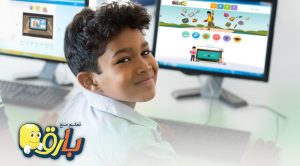 Educational games are also an experience worth taking advantage of and we have, for example:” starfall “and other international sites, and AlMotahida Education Group through such a platform like “Bareq” and “Kalemon” offers rich and useful educational games in support learning of Arabic for non-native speakers, and other studding curriculums.
Educational games are also an experience worth taking advantage of and we have, for example:” starfall “and other international sites, and AlMotahida Education Group through such a platform like “Bareq” and “Kalemon” offers rich and useful educational games in support learning of Arabic for non-native speakers, and other studding curriculums.
It is important to take advantage of your child’s free opportunity many amazing sites to simplify science, mathematics and language education that greatly expand his perception, like “Mystery Science” and “Duolingo”, there are sites to manage the learning experience from home such as: “SCHOLASTIC” and OUTSCHOOL, some of which offer lessons for students at different stages for free.
PBS Kids has launched a new free newsletter on weekdays with educational activities and games for students between the ages of 2 and 8 to do from home.
Not literally
Home schooling can’t literally able to transform the house into a school; you will always have to become a flexible innovator; our children are used to being a learning and home for rest; we must share the importance of adapting to the new emergency, while respecting their preferences and needs.
We know that you are fighting a terrible balance between family and practical commitments; psychological and possibly financial repercussions of the crisis, and your suffering may be compounded if one of your children needs special care (e.g. with learning difficulties),but be sure that no one could lead your son to his ambition except you.

